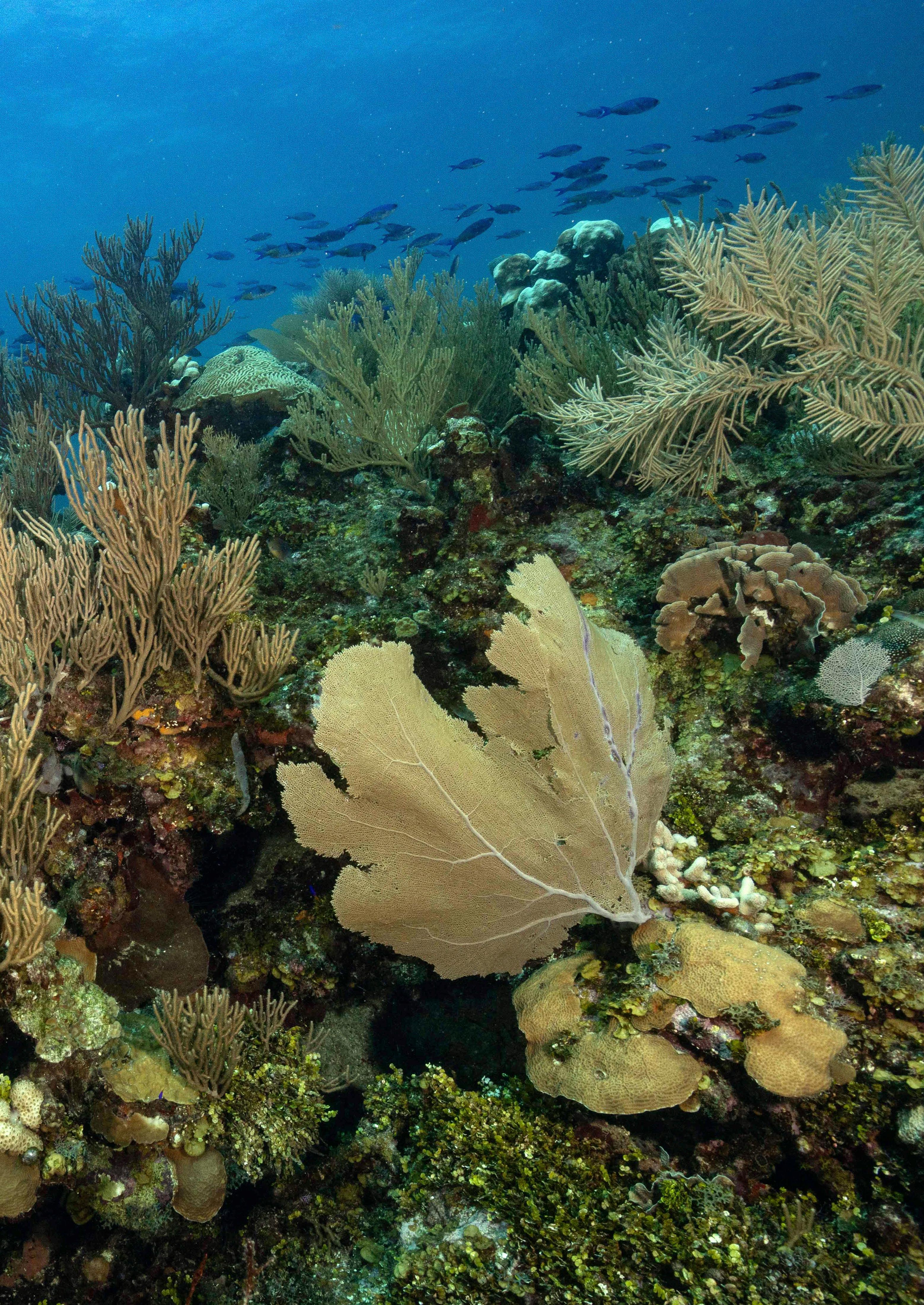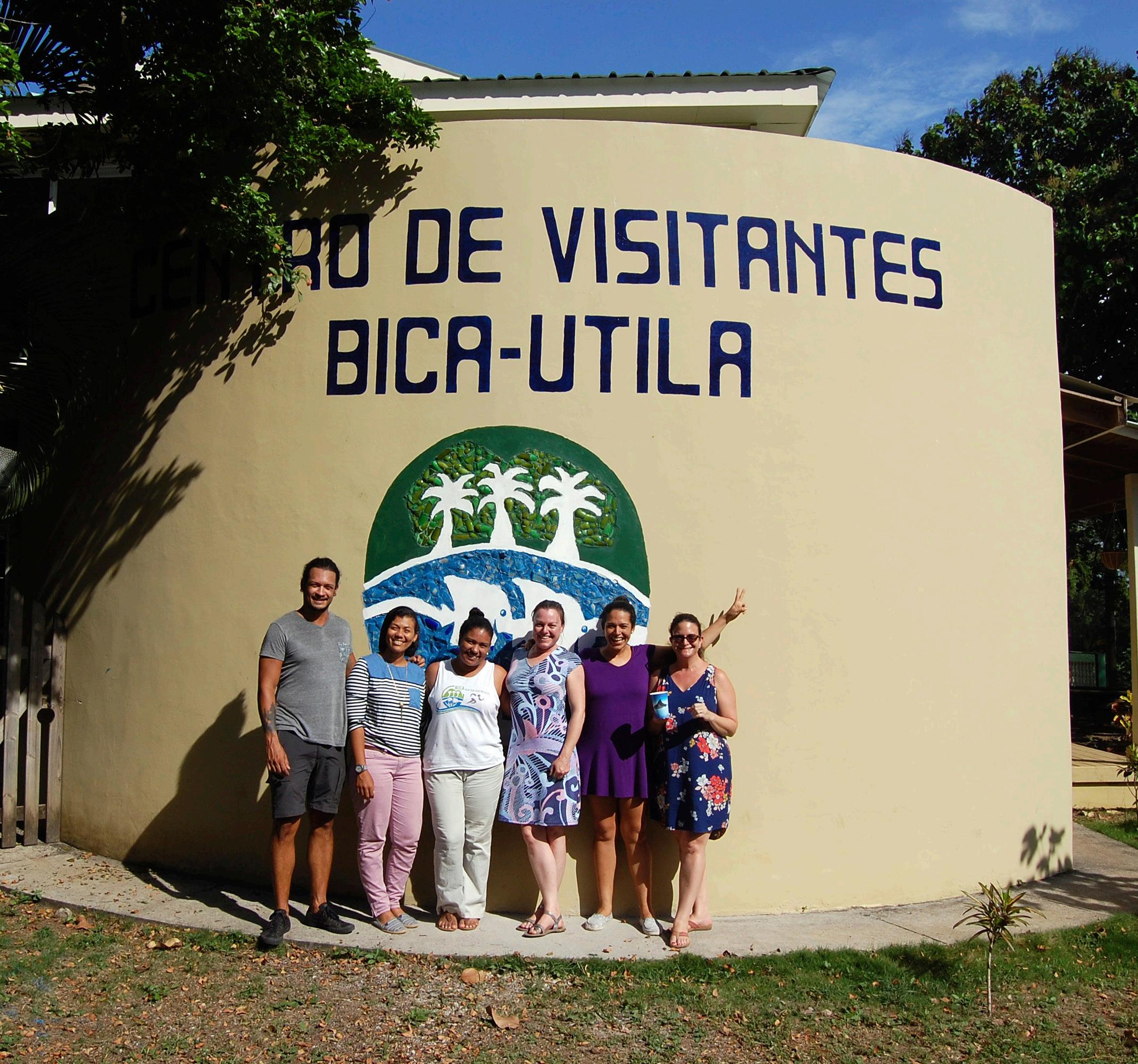
4 minute read
What will it take to Save the World's Coral Reefs?
FEATURE DR. MADHAVI COLTON, EXECUTIVE DIRECTOR AT CORAL REEF ALLIANCE (CORAL)
Advertisement

We have a daunting task ahead of us. Our planet is changing rapidly, and each day brings new stories of the alarming effects of climate change. Antarctica just registered a temperature of 68 degrees Fahrenheit (20˚C) for the first time on record, and the burning bush fires of Australia shocked the world. The speed at which our planet is changing means that the fate of coral reefs will likely be decided within the next 25 years, which is why at the Coral Reef Alliance (CORAL) we’ve pioneered a new, science-based approach to conservation that we believe can save the world’s coral reefs.

Dr. Madhavi Colton (centre) and scientists on a coral survey.
In 1994, CORAL was founded by scuba divers who were looking for a way to get involved in protecting coral reefs. These founding members saw their favourite dive sites in decline, so they began to organise underwater clean-ups, held trainings at scuba shops, and worked with local communities, governments and management agencies to help ensure that reefs were getting the protection they needed. These efforts focused on individual reefs in particular locations, but they weren’t designed to help coral reefs on a global scale.
In the last five years, coral reefs have repeatedly made the news with headlines about their imminent demise. Given the increasing impacts of climate change, it was clear to us that we needed to do more.
In 2016, CORAL asked a critical question: What can we do to help coral reefs survive the coming decades? We convened a group of scientific experts to figure out whether or not coral reefs could adapt to life on a warming planet, and what we could do to help.
Our scientific research shows that there is hope for coral reefs. We published our first results in the journal Nature Climate Change in July 2019. This paper is one of the first to show that conservation that facilitates evolution can help rescue coral reefs from the effects of climate change. We found that the likelihood of successful adaptation increases if local threats are reduced through effective management. Effectively managing reefs includes protecting them from overfishing and water pollution, which improves local conditions for corals. Managed areas serve as sources of repopulation over the long term – corals in managed areas rescue the rest of the reef.
Based on these findings, we are now focusing CORAL’s work on creating networks of healthy reefs in which corals can adapt to warming oceans. If we can create enough networks of well-adapted coral reefs that survive to repopulate other regions, we can ensure the survival of coral reefs for generations to come.

Dr. Madhavi Colton (third from right) and CORAL team members and partners in Utila, Honduras.
At CORAL, we also know that reducing local stressors is most successful when it happens in partnership with the people that rely on reefs for livelihoods and well-being. Today, we are proud to partner with local communities to reduce local stressors, including land-based pollution and over fishing. For example, in Honduras, our partnership with residents, business owners and the government has improved water quality resulting in fewer instances of coral disease. We have also partnered with local non-profits to make sure that the marine protected areas (MPAs) that we have helped to establish are effectively managed, resulting in increased fish biomass. Efforts like these are creating the local conditions that allow healthy corals to thrive, and because this work is part of a network, these reefs contribute to adaptation and repopulation across the entire Mesoamerican Reef system.
Simultaneously, we’re turning our scientific results into actionable conservation guidelines that can be used to help corals around the world adapt to a warming world. We are doing this by building mathematical models and using them to develop regional coral reef conservation plans for the Caribbean, Pacific, and Coral Triangle. From this, we will be able to identify the conservation actions that facilitate evolutionary rescue. We are putting these guidelines into action through our conservation programmes in the Mesoamerican Region and the Main Hawaiian Islands.
I’ve seen the positive change that local communities make when protecting their reefs. And I know that these local actions can have a larger impact because our scientific research shows that this is what helps corals adapt. We can help corals survive and continue to provide benefits to people and wildlife for generations to come.
But we can’t do this alone: Success requires that we work together. At CORAL, our vision is a world where corals have adapted to climate change because of our actions and also those of our partners, fellow scientists and scuba divers like you. It’s not too late to save the world’s coral reefs; learn more and join us at www.coral.org.

Dr. Madhavi Colton










